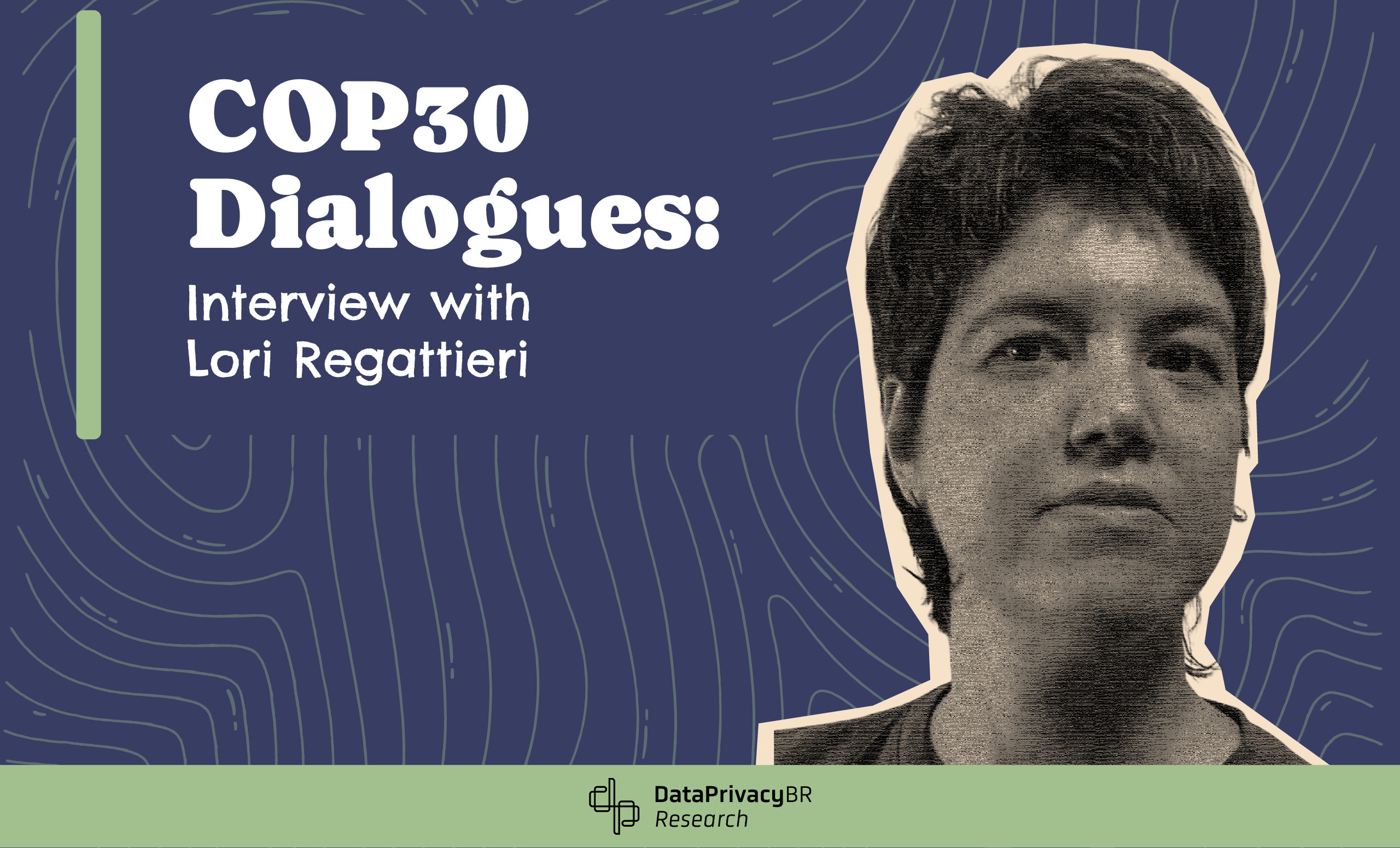COP30 Dialogues: Interview with Lori Regattieri
Data Privacy Brasil launches the new interview series “COP30 Dialogues: digital Rights and Climate Justice,” aiming to hear diverse voices on the interface between the climate agenda and digital rights. The new project emerges in a unique year: the first United Nations Climate Change Conference (COP30) in Brazil.
Data Privacy Brasil launches the new interview series “COP30 Dialogues: digital Rights and Climate Justice,” aiming to hear diverse voices on the interface between the climate agenda and digital rights. The new project emerges in a unique year: the first United Nations Climate Change Conference (COP30) in Brazil.
COP30 is scheduled to take place between November 10th and 21st, 2025, in the city of Belém, located in the state of Pará. The interviews are taking place within Data’s “Asymmetries and Power” area and will feature a variety of experts on the topic. The interviews seek to answer the general question: what is the intersection between climate justice and data justice? To this end, we engage with stakeholders from different sectors and interests to build collective learning on the topic.
In our first interview, we spoke with Lori Regattieri, a researcher, manager, and consultant working on the climate agenda, territorial rights, and emerging technologies. The conversation highlighted topics such as the role of indigenous peoples, the role of technology, and the place of multilateralism.
Check out the full interview and follow our channels for future updates.
Data: First, how important is it for professionals specializing in environmental protection to work alongside professionals specializing in digital rights? How can these professionals help?
Lori: In this coalition I’m part of [Green Screen Coalition], we ended up being able to make some assessments about the challenges involved in the technology lifecycle, which are perhaps a bit more specific in this hyper-optimistic wave of artificial intelligence. And what I’ve been reflecting on a lot is the interdisciplinarity of what we call in Brazil CTI—that is, science, technology, and innovation—and the role of professionals who work directly with regulations. It turns out that it’s not just in Brazil, but legal professionals end up playing a role both in a space where strategic litigation is a very particular place for corporate pressure and in helping us truly see these issues that are part of the life cycle of emerging technologies today.
We are facing challenges that, perhaps because of my long experience with Brazilian environmentalism—which has a long tradition involving legal professionals—continue to play a historically very important role, especially with regard to our Constitution. Thus, in a specific period, after the promulgation of the Constitution and in the face of the transformations occurring in the political disputes within Congress, legal professionals manage to maintain their place. I would say it’s a specific place, something that concerns these professionals. Of course, it’s understood that they are the ones who possess the literacy of this legal architecture and the design of these functions.
In this context, we sometimes perceive a disconnect between the paths outlined by our legal colleagues and the reality of a space where we haven’t yet had many moments of interdisciplinary conversation.
It is essential to create spaces where legal professionals, who have long worked on these challenges and, especially, on multisectoral issues—a very valuable characteristic in Brazil—engage in conversations at different levels: with the private sector, civil society, and the State. This approach comes from the Internet Steering Committee and teaches us a lot. However, it’s clear that the spaces where interdisciplinarity could gain substance are, I would say, not so welcoming to professionals from fields other than law.
When we begin to observe the framework, this architecture that exists today, perhaps specifically in Brazil, where there is an intense exchange of knowledge and, above all, alliances and agreements between different civil society organizations, we see the existence of environments with spaces for interdisciplinarity. However, in my assessment, these spaces are still not sufficient for us to go beyond, for example, sporadic demonstrations at events like the Internet Forum in Brazil or other spaces for political advocacy. Rather, it is possible for people and organizations with different agendas to participate. I believe we have a task for this year, with COP30 in mind, which is to truly expand these spaces.
Data: In your opinion, will COP30 be a privileged space for these debates?
Lori: I’ve been working with the idea that we have a COP that is much more dependent on the People’s Summit than the People’s Summit is dependent on COP30. The People’s Summit is an event led by civil society organizations, a committee, and a secretariat. At the same time as COP30, we’ll also have the People’s Summit.
Today, we’re talking about 2025, a long-standing effort by Brazilian civil society and grassroots movements to transform the COP’s design. This is an important point. What’s happening today—I think we’re at a point where we understand that the COP is in the forest, but the COP isn’t just about the forest—is also about these impacts we call externalities, from our aquifers; we’re also talking about justice and access to water. We understand the issues, so to speak, from the ground up for those on the front lines. But we also have, within the COP, discussions on political advocacy. This truly gains a higher-level status because it’s at decision-making levels that, of course, seem very distant.
But I think it’s important to note this. But, like, today we have a very strengthened civil society in Brazil. We’re approaching COP30 with a very long buildup, and it’s not just this year’s buildup, because there will be the People’s Summit, but a long-standing buildup, with work agendas that were very constitutive of a place, which is what Brazil occupies.
What I also wanted to highlight are these important points that make COP30 a privileged space, where you’ll have global movements, indigenous peoples from around the world, impacted peoples from around the world, and organizations and actors participating in a COP, bringing their solutions, their innovations, their visions, and their projects for the future. When we’re talking about information and communication technologies, when we’re talking about artificial intelligence and the cycle of this industry – which is, for many, synonymous with a perspective of what could come to be, for example, we can look at Brazil and reflect on jobs that are fairer for workers, but also, at the same time, what it means to have Brazilian youth that is not being welcomed in this environment of promises.
This sector thrives more on hype than on what will become. COP30 is also heavily influenced by the AI hype and greenwashing of the impact of massive computing data centers. And this is a latent challenge we’ll face at the COP, because we’ll have a highly competitive environment.
We face a challenge in the climate adaptation agenda, because it’s an agenda that, for example, also has strong leadership from Brazilian civil society organizations—Black organizations, Indigenous organizations—that have been lobbying for the political agenda of adaptation and the role of technology in these agendas.
Data: Have you seen the COP as a window of opportunity for advocacy for civil society organizations?
Lori: I think this opportunity we have at the COP is an opportunity to advocate for an agenda that is in dispute—which is an agenda regarding transparency, regarding how we’re addressing gender and racial issues within the negotiation agenda. And so, you have a preparation for the COP that is being built collectively by Brazilian organizations.
These challenges, when we’re talking about Brazil’s role, also concern Brazil’s leadership within the BRICS. In other words, what does that look like? I think COP30 is shaping up to be a very decisive space in terms of how we can articulate open innovation, climate justice, and digital sovereignty.
Because we’ll face a truly major challenge, not just regarding fossil fuel issues, but also regarding the policy of attracting data centers. But, of course, what we’ll have much more presence on are the specific issues regarding the Paris Agreement discussions and specific points that are also priorities for the Brazilian presidency’s agenda. And, thus, ideas and perspectives on the role of technology—and, above all, not just a neutral or positive perspective—but, thus, talking about technology not just as an instrument, but as an agenda for competition, where you have the big tech lobby, you have consultancies, you have what I would say is a very aligned and cohesive presence of business groups and corporations when it comes to technology, large-scale computing, and the role of renewable energy plants being installed. We need to recognize, in fact, that these issues I’m listing now are not latent themes in the environmental debate in Brazil. And, indeed, we are at a time when things are happening.
Data: What are your expectations for COP30 regarding the movements that have been taking place in civil society? Do you think it will be a space more open to dialogue and more decisive?
Lori: The COP is notorious for not having resolutions. You have a COP negotiation agenda that may or may not happen that way. There’s already something that civil society has been cultivating as an interest: you have the issue of adaptation, you have research and development as a priority agenda, you have the issue of biodiversity. For example, the Escazú Agreement is still an important agreement for us who are involved in the debate on digital and socio-environmental rights, because it’s succeeding in creating a working environment where we can work together and reflect on what we want to say about data protection and how to link these discussions to the protection of indigenous peoples, traditional communities, in the sense of their knowledge, their intellectuality, their epistemologies, also within these mechanisms where decisions ultimately happen.
So, let this be part of our pluriversality—I would say, the hallmark of the Global South—of looking at Brazil through this lens: a racialized lens, a lens I often call a kaleidoscope. If we deny this and try to adapt, perhaps, to what could be a successful or decisive COP, I think we’ve lost a lot. So, I think it’s also necessary to make room for uncertainty, in a way… a certain impropriety that this event already precedes.
The debates on funding could also welcome, within these background designs, a specific technology component—more science, technology, and innovation. How can we bring these components to the debates on funding that will take place at the COP? Because, sometimes, we also realize that arriving at a background design can be very decisive. Indigenous peoples are very active in the design of these funds. We have very good examples—in fact, the indigenous peoples of Brazil have been demonstrating the role of indigenous funds to the world.
More than a decisive COP, I think it’s a COP that, perhaps, welcomes the improprieties that are already part of and precede this welcoming space of the action agenda, which I think Brazilian civil society is working hard to share.
Data: Finally, how have you seen the relationship between climate justice and digital technologies?
Lori: I’ve been trying to think a lot from the perspective of how the Global South is positioning itself in the face of this new innovation policy, and I wanted to frame this within the framework of science, technology, and innovation. I think the CGI is a very important example, where you have the presence of these three little words—which are not only pretty, but, when implemented, are very successful. So, you have multilateralism, and you have the opportunity for Brazil to demonstrate, with this combination of science, technology, and innovation, principles that are constitutive of planning, of a program that can show, for example, to young people that they can have a future. Building a possibility for a future based on a program that truly speaks.
I was thinking from a perspective where we have a future for a different kind of youth. How can we present something we already have as experience as a source of hope for this future? I often have this example of cases where technology is entering a perspective of projects in the “sociobioeconomy” and the commercialization of Amazonian products. You have the role of technology in monitoring emissions, and you have the role of technology in protecting indigenous territories—in short, you have several extremely important and interesting uses today, which are already part of various actions and implementations in which technology is not just part of something to be used but is a sociotechnical component.
So, that’s why I mention these three words that, for me, are part of Brazil, of the way Brazil’s trajectory has shown the world how it is possible to produce public policies. It really means building a context that is multilateral, pluriversal, and multisectoral. It is multilateral because it can dialogue with countries from a diplomatic perspective of dialogue, not of tariff war, as the United States is doing. We don’t want to develop a new imperialism. And even when you think, for example, about the BRICS and their asymmetries, how much better it would be if we could exchange experiences and knowledge, considering the impact on the people of the countries—whether in India or in Brazil. Multilateralism, pluriversalism, and multistakeholderism. And especially, taking the example of internet governance in Brazil, I think these are three key words for this horizon of science, technology, and innovation governance.
About Lori Regattieri
Lori Regattieri is the founder of “Eco-Media: Technology in Times of Socio-Environmental and Climate Emergency,” which proposes, through research, community practices, and collaborations with partners, to design new protocols and documentation and build technologies to serve those who have historically been marginalized. She is also a Practitioner Fellow in Democracy at the Karsh Institute of Democracy at the University of Virginia. As a consultant to the philanthropic sector and civil society organizations, she facilitates intersectoral collaborations and strengthens South-South coalitions for climate justice.
Works in partnership with movements defending the rights of Indigenous peoples, Afro-descendants, and local communities (IPADLC), articulating political economy, sociotechnical systems, and racial justice to develop strategies for territorial sovereignty, energy sovereignty, and inclusive economies. A member of the Green Screen Coalition and the Climate Social Science Network of the Institute at Brown for Environment and Society. She was a Senior Fellow in Artificial Intelligence at the Mozilla Foundation. Holds a PhD in Communication and Culture from the Federal University of Rio de Janeiro (UFRJ). For over two decades, she has investigated topics related to science, technology, and culture, as well as the political economy of AI-driven infrastructures, testimonies, and archives, drawing on decolonial approaches inspired by kinship and world-making practices. In recognition of her contributions, she received the 2024 Jacques Ellul Prize for Activism in Media Ecology, awarded by the Media Ecology Association.
Veja também
-
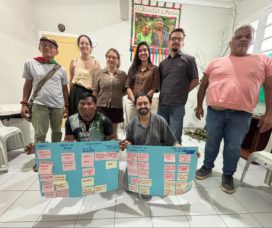
COP30, Data and Land Use: Discussing Agendas to Combat Land Grabbing
On November 12, 2025, Data Privacy Brasil held a roundtable discussion on data and land grabbing as part of the COP do Povo program, a parallel event to COP30, entitled "COP30, Data and Land Use: Discussing Agendas to Combat Land Grabbing,".
-
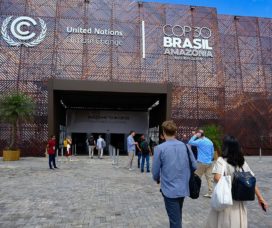
COP30: Why local communities must have access to environmental information in data center development
At COP30, Brazil speaks of reforestation and indigenous wisdom. But Bruno Bioni, Mariana Rielli, and Rafael Zanatta argue that the country’s generous tax incentives for data centers must be tied to the collective right of access to environmental information, or risk deepening the very injustices the climate summit seeks to undo.
-
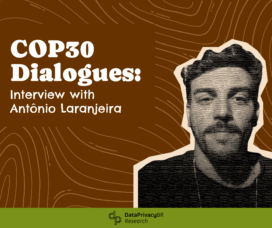
COP30 Dialogues: Interview with Antônio Laranjeira
In the second interview for our special series “COP30 Dialogues: Digital Rights and Climate Justice,” we spoke with Antônio Laranjeira, an award-winning journalist for investigative reporting on topics such as environmental loss and damage, science, and citizenship.
-
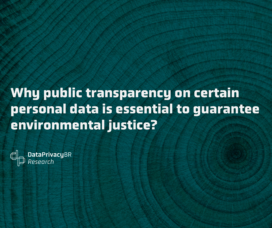
Why public transparency on certain personal data is essential to guarantee environmental justice?
Between 2022 and 2023, Data Privacy Brasil developed the project Environment and Information: contesting the political instrumentalization of LGPD in Environmental Regulation which focuses on the intersection of digital rights and environmental policies.
-
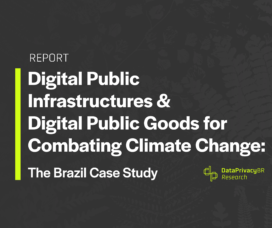
Digital Public Infrastructures & Digital Public Goods for Combating Climate Change: The Brazil Case Study
Data Privacy Brasil, with the support of the Digital Public Goods Alliance (DPGA), launches a new report that aims to analyze the integration between Digital Public Infrastructure (DPI) and Digital Public Goods (DPGs) as tools to combat climate change.
-
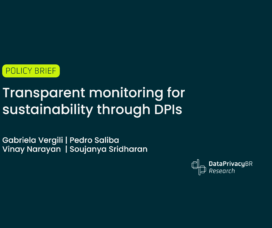
Transparent monitoring for sustainability through DPIs
In this new publication, researchers Gabriela Vergili, Pedro Saliba from Data Privacy Brasil, Vinay Narayan and Soujanya Sridharan from Aapti Institute, discuss the “Transparent monitoring for sustainability through DPIs”.
-
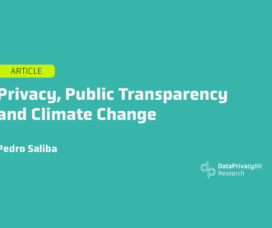
Privacy, Public Transparency and Climate Change
How transparency and data protection can help environmental public policies in Brazil.
Veja Também
-

COP30, Data and Land Use: Discussing Agendas to Combat Land Grabbing
On November 12, 2025, Data Privacy Brasil held a roundtable discussion on data and land grabbing as part of the COP do Povo program, a parallel event to COP30, entitled "COP30, Data and Land Use: Discussing Agendas to Combat Land Grabbing,".
-

COP30 Dialogues: Interview with Antônio Laranjeira
In the second interview for our special series “COP30 Dialogues: Digital Rights and Climate Justice,” we spoke with Antônio Laranjeira, an award-winning journalist for investigative reporting on topics such as environmental loss and damage, science, and citizenship.
-

Why public transparency on certain personal data is essential to guarantee environmental justice?
Between 2022 and 2023, Data Privacy Brasil developed the project Environment and Information: contesting the political instrumentalization of LGPD in Environmental Regulation which focuses on the intersection of digital rights and environmental policies.
-

Digital Public Infrastructures & Digital Public Goods for Combating Climate Change: The Brazil Case Study
Data Privacy Brasil, with the support of the Digital Public Goods Alliance (DPGA), launches a new report that aims to analyze the integration between Digital Public Infrastructure (DPI) and Digital Public Goods (DPGs) as tools to combat climate change.
-

Transparent monitoring for sustainability through DPIs
In this new publication, researchers Gabriela Vergili, Pedro Saliba from Data Privacy Brasil, Vinay Narayan and Soujanya Sridharan from Aapti Institute, discuss the “Transparent monitoring for sustainability through DPIs”.
-

Privacy, Public Transparency and Climate Change
How transparency and data protection can help environmental public policies in Brazil.
DataPrivacyBr Research | Content under licensing CC BY-SA 4.0

